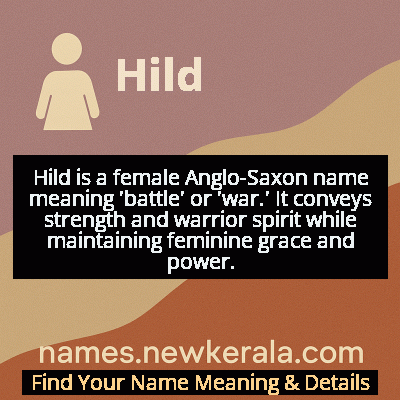Hild Name Meaning & Details
Origin, Popularity, Numerology Analysis & Name Meaning of Hild
Discover the origin, meaning, and cultural significance of the name HILD. Delve into its historical roots and explore the lasting impact it has had on communities and traditions.
Name
Hild
Gender
Female
Origin
Anglo
Lucky Number
6
Meaning of the Name - Hild
Hild is a female Anglo-Saxon name meaning 'battle' or 'war.' It conveys strength and warrior spirit while maintaining feminine grace and power.
Hild - Complete Numerology Analysis
Your Numerology Number
Based on Pythagorean Numerology System
Ruling Planet
Venus
Positive Nature
Harmonious, responsible, caring, and artistic.
Negative Traits
Overly idealistic, superficial, possessive, or jealous.
Lucky Colours
Pink, turquoise.
Lucky Days
Friday.
Lucky Stones
Diamond, turquoise.
Harmony Numbers
2, 3, 9.
Best Suited Professions
Artists, musicians, teachers, healthcare workers.
What People Like About You
Warmth, nurturing nature, artistic flair.
Famous People Named Hild
Hild of Whitby
Abbess and Saint
Founded Whitby Abbey and presided over the Synod of Whitby
Hild Bill
Academic
Renowned scholar in Old English literature and Anglo-Saxon studies
Hild Anderson
Artist
Noted contemporary painter specializing in mythological themes
Name Variations & International Equivalents
Click on blue names to explore their detailed meanings. Gray names with will be available soon.
Cultural & Historical Significance
The name's cultural significance extends beyond its historical roots to represent a particular ideal of feminine power—one that combines strength with wisdom, battle prowess with spiritual depth. In modern reinterpretations, Hild has come to symbolize women who break traditional gender roles while maintaining their feminine identity. The character Hild in Nicola Griffith's acclaimed novel has further revitalized the name's cultural relevance, presenting a complex, intelligent woman navigating the political and religious landscape of seventh-century Britain. This ongoing cultural resonance ensures that Hild remains not just a historical artifact but a living name with continued symbolic power.
Extended Personality Analysis
Individuals named Hild are typically perceived as strong-willed, determined, and natural leaders with a strategic mindset. They often possess a quiet intensity and resilience that allows them to overcome challenges with grace and determination. Their warrior-name heritage tends to manifest as mental and emotional strength rather than physical aggression—they're more likely to fight for causes, principles, and those they care about. Hilds are often practical problem-solvers who approach difficulties with clear-eyed realism and persistence.
Beyond their obvious strength, people named Hild frequently exhibit deep loyalty and protective instincts toward their loved ones and communities. They tend to be observant and perceptive, able to read situations and people with remarkable accuracy. This combination of strength and insight makes them excellent in leadership positions or as trusted advisors. While they can be formidable when challenged, they typically balance this strength with compassion and a strong sense of justice. Their battle-ready nature is tempered by wisdom, making them not just warriors but strategists who understand when to fight and when to seek peaceful solutions. This balance of strength and wisdom often makes Hilds particularly effective in careers that require both determination and emotional intelligence.
Modern Usage & Popularity
In contemporary times, Hild remains a relatively uncommon but respected name, often chosen by parents seeking a strong, historical name with Anglo-Saxon roots that isn't overly popular. It has seen a modest revival in recent years as part of the trend toward vintage and mythological names, particularly among families with English or Scandinavian heritage. While it hasn't reached mainstream popularity charts, it maintains a steady presence in academic and artistic circles where historical and literary names are appreciated. The name is sometimes used as a short form of Hilda or Hildegard, but increasingly stands alone as a distinctive choice that conveys strength and history without being overly common. Its rarity adds to its appeal for parents seeking unique yet meaningful names with deep cultural roots.
Symbolic & Spiritual Meanings
Symbolically, Hild represents the concept of 'battle' in its broadest sense—not just physical combat, but the struggles and challenges one faces throughout life. It embodies resilience, courage, and the ability to confront difficulties with strength and strategy. The name carries connotations of protection and guardianship, hearkening back to its valkyrie origins where these mythical figures were both choosers of the slain and protectors of warriors. In a modern context, Hild symbolizes inner strength, moral courage, and the capacity to fight for what is right. It represents the warrior spirit channeled into constructive purposes—whether defending principles, leading communities, or overcoming personal obstacles. The name suggests someone who meets life's battles with dignity and determination, transforming conflict into opportunity for growth and positive change.

